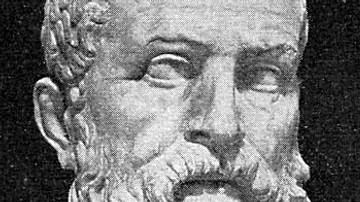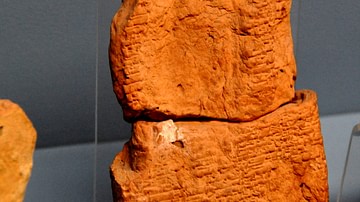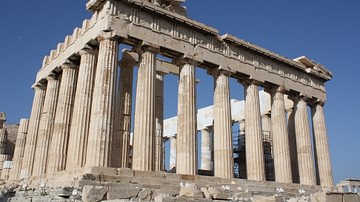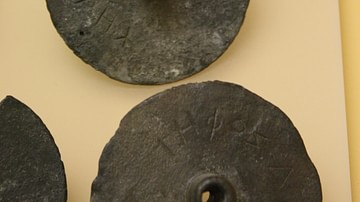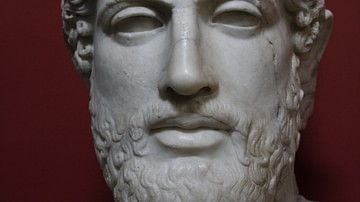
Draco was an aristocrat who in 7th century BCE Athens was handed the task of composing a new body of laws. We have no particular clues concerning his life and general biography and the only certainty is that, as an aristocrat and an educated man, he was in the right place at the right time in order to take his opportunity and legislate. During the infancy of the Athenian legal system Draco composed the city's first written law code with the aim of reducing arbitrary decisions of punishment and blood feuds between parties. Ultimately, though, the laws aided and legitimized the political power of the aristocracy and allowed them to consolidate their control of the land and poor. Famously harsh, the laws were ultimately replaced by Solon in 594 BCE.
Historical Background
Αfter the creation of city- states (πόλις - κράτος, polis - kratos) in Greece, around the 8th Century BCE, sovereigns in major cities like Athens started losing power. The king, in order to maintain power and safety in his city started sharing the land with various noblemen, that in the first place, had been members of his council of war. Later, these noblemen created the hoplite phalanx (οπλιτική φάλαγγα, oplitiki falagga). The phalanx was not only a military group of men but gradually shaped into a political body and eventually gained power from the King. Thus, an aristocracy was born. In Athens, the aristocrats controlled the land and they had most of the privileges, the political rights, and, of course, the money in the polis. The law was held by them and was only written for their own purposes and from their own perspective. Most Athenians had to live in relative poverty and under this regime simple workmen and farmers had no choice but to be ruled by the aristocrats. Gradually the Athenians found themselves in a city where very few held political power, money, land and, most importantly, control of the (unwritten) law.
Justice has not always been dispensed by judges operating under a written or common law equally applicable to all. In early Athens, justice was not a matter of applying a written standard to any situation or dispute. There were no explicitly written sentencing guides or judicial precedents on which to call. Rather, the victims themselves were responsible for exacting retribution or compensation for any crime. If the victim was dead, the family was left to take revenge or seek compensation. These blood feuds could last for generations as families sought to avenge a loss, rarely admitting fault and always seeking absolution. (Salowey & Northen Magill).
The Beginning of A Legal System
As time wore on, groups of citizens came together to consider how to prevent transgressions or punish criminals from other areas and thus avoid protracted wars based on blood feuds. Popular assemblies were called for this purpose in instances where the action affected the community as a whole. Over the years, leaders within the aristocracy of Athens began issuing their rulings. This system was not without its problems, as these “chiefs” were often the recipients of bribes.
In addition, according to Aristotle, borrowing in ancient Athens was allowed and as a warranty, or as a security deposit, it was “allowed that one can borrow from another with a warranty his property and his personal freedom”. (The Athenian Constitution, 1306b 22-25, 1307a 7). So, the basic problem was not only who had the land or the political power but that a lot of small land owners gradually got into debt and started losing their land, ending up servants to the rich. The major problem was that no laws for the above were written down and the poor were not able to stand in a court where only aristocrats were judging and no written law was there to protect them.
Around 632 BCE, an aristocrat and former winner at the Olympic games, called Kylon (Κύλων), tried to overcome the aristocratic party that ruled Athens and become a sole tyrant. Kylon, actually, was trying to use the Athenian's will for a change: that is a change against the aristocrats that held the land and the political power in Athens at that particular time. The attempt to make himself tyrant, in the end, did not succeed and his followers were slaughtered by the aristocrats and Kylon fled to his father-in-law, Theageni (Θεαγένη), the Tyrant of Megara (Mέγαρα). If we look a bit more deeply into the affair, Kylon was really trying to grab the momentum of the poor people (mostly farmers and small land owners) that had lost their land to the wealthy landlords mostly due to debts and the fact that no law was ever written in Athens by that time and thus, the land was held by few aristocrats and justice was nowhere to be found.
If we sum up the two above facts, the Kylon rebellion and the farmers/small land owners reaction to all this, we come to the conclusion that laws had at last had to be written. Indeed, the aristocrats summoned Draco (Δράκων) to write down the First Law Code of Athens. This happened in 621/620 BCE. The actual text of the laws was preserved only by Aristotle in his book The Athenian Constitution.
Draco's Laws
Draco's laws were known for their cruelty and their bias towards the rich landowners as opposed to those who found themselves owing money. His series of drastic punishments (the origin of the term 'draconian') for a variety of crimes were not actually in force for long and certainly did not succeed in their aim. This rudimentary law-code of which we know only the provisions regarding homicide were written, according to tradition and myth in blood because of their perceived cruelty. Below are some examples quoted in The Athenian Contitution (translated by the author according to Inscriptiones Greacae 1 115):
…political rights (in Athens) can only belong to those that carry weapons. These rights are especially for lower rank lords whereas in order for someone to be elected as a general or head of cavalry (ίππαρχος, ipparxos) he should have a fortune of over 100 mnes and have a legitimate Athenian wife and children over 10 years old.
He who kills another Athenian, without a purpose or by accident should be banished from Athens for ever. If the killer apologizes to the family of the murdered man and the family accepts the apology, then the murderer may stay in Athens.
A relative of a murder victim, can hunt and take into custody the murderer and thus hand him to the authorities where he will be judged. If a relative kills the murderer he will not be allowed to enter the Athenian Forum («αγορά», agora), or participate in competitions or set foot into sacred places...
The End of Draco's Law Code
Draco's law code was later regarded as intolerably harsh, especially in regards to punishing trivial crimes with death; it was probably unsatisfactory to contemporary rulers too, since Solon, who was the archon in 594 BCE, later repealed Draco's code and published new laws, retaining only Draco's homicide statutes. The cruelty behind the laws may have been the only a way to sustain power within the aristocratic party as well as preventing blood feuds that could last for generations. In addition, the aristocrats found a way to secure land by legitimately taking it from the poor according to written laws besides their real political power. Under Draco's law code the rulers were in power in accordance with the law and, as they saw it, justice.

